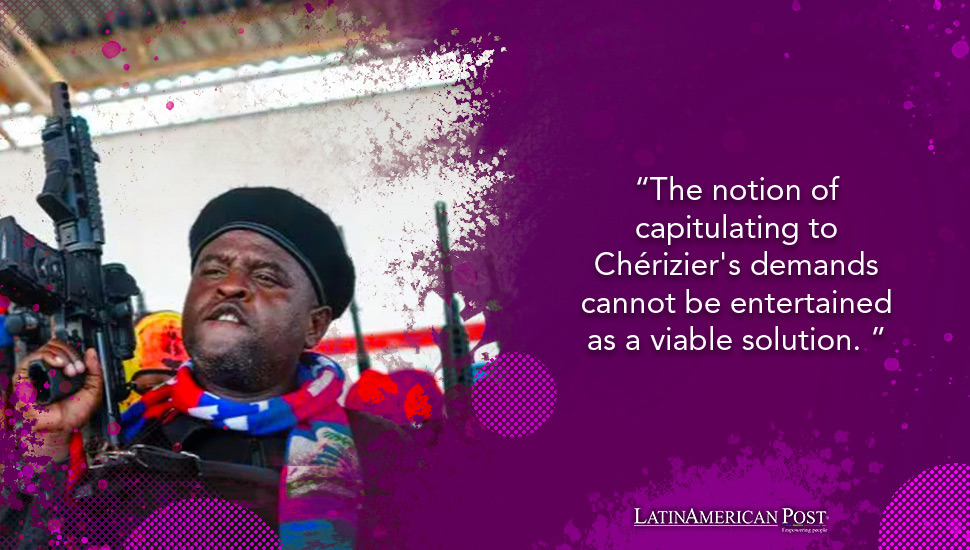A Firm Stance Against Extortion: Charting a Path for Haiti Without Capitulation

Amid Haiti’s escalating crisis, gang leader Jimmy Chérizier, known as ‘Barbecue,’ has issued a request demanding Prime Minister Ariel Henry’s resignation, threatening genocide. This opinion piece argues against negotiations with threats and explores sustainable solutions to Haiti’s turmoil, considering broader Latin American parallels.
In a nation already marred by political instability and widespread violence, Haiti faces a new, alarming chapter as Jimmy Chérizier, alias ‘Barbecue,’ a notorious gang leader, demands the resignation of Prime Minister Ariel Henry under the threat of pushing the country toward “genocide.” Such stark ultimatums raise critical questions about the efficacy and morality of negotiating under duress and underscore the urgent need for a cohesive strategy to restore peace and governance in Haiti without yielding to coercion. This piece contends that capitulating to such demands only perpetuates cycles of violence and instability; a lesson echoed across Latin America’s historical and contemporary struggles with armed groups.
The Haitian Quagmire: Context and Current Crisis
Haiti’s tumultuous history, characterized by coups, corruption, and calamities, sets the stage for the current crisis, where armed gangs wield significant power, challenging the state’s authority. Chérizier’s threats come amidst an alarming rise in violence, with recent jailbreaks leading to the escape of thousands of inmates, exacerbating the nation’s security woes. The gang leader’s bold claim that international support for Henry would lead to civil war and genocide further complicates Haiti’s path to stability, implicating foreign nations in the country’s distress.
The Folly of Negotiating with Threats
History, both within Haiti and in other Latin American nations, has shown that negotiating with those who wield threats and violence as their primary tools seldom yields lasting peace or justice. Instead, it encourages perpetrators, undermines legitimate governance, and deepens cycles of violence. Therefore, the notion of capitulating to Chérizier’s demands cannot be entertained as a viable solution. Doing so would set a dangerous precedent and fail to address the root causes of Haiti’s plight.
Latin American Echoes: Learning from Regional Experiences
Latin America’s experience with armed groups, from Colombia’s FARC to El Salvador’s gang truces, offers valuable insights into the complexities of negotiating under threat. Colombia’s peace process, though imperfect, highlights the importance of comprehensive approaches that include justice, reparation, and systemic change beyond mere power-sharing or ceasefires. El Salvador’s failed gang truces, on the other hand, demonstrate the pitfalls of short-term solutions that lack broad societal support and fail to tackle underlying issues.
Charting a Path Forward for Haiti
Strengthening State Capacity and Rule of Law: Building a robust and accountable state apparatus that can enforce the rule of law and provide essential services is paramount. International support should focus on institution building rather than mere military or financial aid.
Comprehensive Security Strategy: Addressing gang violence requires a multi-faceted approach that includes community policing, social programs to deter gang recruitment, and targeted actions against gang leaders based on intelligence and legal frameworks.
Inclusive Political Dialogue: Genuine dialogue involving a broad spectrum of Haitian society, including civil society, political parties, and community leaders, is crucial to forging a consensus on the nation’s future.
Economic Revitalization and Social Programs: Economic instability fuels gang recruitment and violence. Efforts to revive Haiti’s economy, alongside social programs aimed at the most vulnerable, are vital components of a long-term strategy for peace.
Regional Cooperation: Haiti’s crisis does not exist in a vacuum. Through bodies like CARICOM and the OAS, regional cooperation is essential for addressing cross-border issues such as trafficking and migration, which are intertwined with the nation’s security challenges.
Also read: Amplifying the Cry for Help: Haiti’s Youth on the Brink and the Global Duty to Act
Beyond the Immediate Crisis
The demands laid forth by ‘Barbecue’ and the ensuing threats represent more than a political standoff; they are symptomatic of deep-seated issues that require comprehensive, long-term solutions. Yielding to such ultimatums is not only untenable but also counterproductive. With the support of the international community and lessons drawn from Latin America’s broader experience with armed groups, Haiti must chart a new course. This course should prioritize governance, justice, and development, aiming not just to quell the current violence but to build the foundations for a more stable and prosperous future. The path forward is undoubtedly fraught with challenges. Still, it remains the only viable route to reclaiming Haiti’s sovereignty and setting a precedent for dealing with similar crises across the region.





